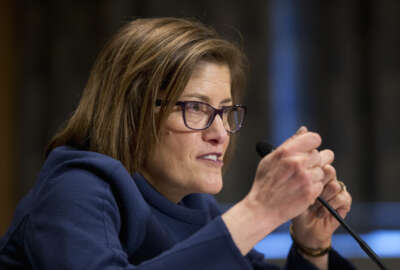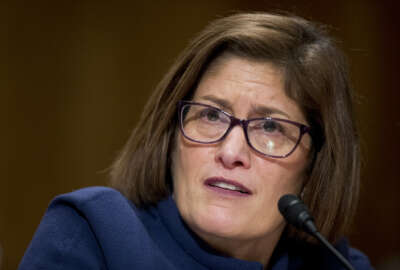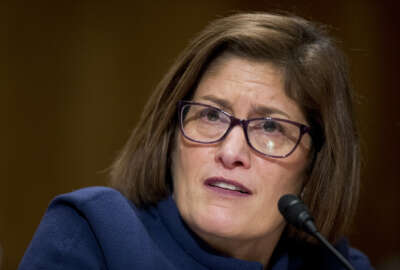
Departing director offers advice to next OPM leader
Beth Cobert has held two high-pressure jobs in the Obama administration: the acting director of the Office of Personnel Management and the deputy director for...
Beth Cobert has held two high-pressure jobs during the Obama administration — often at the same time.
Now as she prepares to leave government in the coming days, Cobert has some advice for the next director of the Office of Personnel Management — a job she inherited shortly after news broke of two major cyber breaches at the agency — and the next deputy director for management at the Office of Management and Budget.
“Actually understand the scope, the scale, [and] the complexity of the federal workforce,” Cobert said during an interview with Federal News Radio.
The federal workforce is more educated than the private sector, she said. And it operates under a set of merit system principles that she said federal leaders should take the time to understand.
But she suggests that future OMB and OPM leaders should study up, learn about the nuances of the federal workforce and find ways to craft policies and guidance that will have a broad impact.
“You have to find the right balance as the person trying to coordinate activities across the federal government in a government that basically operates in separate vertical silos,” Cobert said. “If you want to work horizontally, you have to think about those agencies. I certainly did coming in. How was I going to listen to them and understand what they particularly needed yet find sufficient commonality so we could actually get something done at scale and at pace? That was the lesson that I took from both of them.”
Though Cobert said many of the lessons she learned in government can apply to both roles she’s held, her post at OPM covered a wide range of topics. Though she stepped in to lead the agency’s recovery from two major cyber breaches, she also inherited federal employees’ health benefits program, a backlog of unprocessed retirement claims and an array of responsibilities under the President’s Management Agenda.
“This is a really operational place,” Cobert said. “You could count the millions of touches, transactions and things we do, and while some out there in the world think about the policy part of OPM, and boy is that important, we actually do a lot of work.”
SES
For Cobert, facilitating and then watching agencies implement the President’s executive order on the Senior Executive Service was a highlight of that work during her tenure.
“I know at HHS they’ve actually created a committee of their senior executives to lead the implementation of their work on the EO,” she said. “We have a whole set of programs going with the phase 1 agencies and the phase 2 agencies. We are really trying to make this something that’s owned by agencies, because frankly … that’s how you make something stick in a sustainable way.”
President Barack Obama signed in December 2015 an executive order outlining reforms to recruit, develop and retain current and future members of the SES. One highlight of the order required that OPM work to reduce pay compression between SES members and federal employees at the upper echelons of the General Schedule.
“That has happened,” she said. “We’ve changed that for hundreds of people. That policy is done and executed at the agency levels.”
OPM is also in the midst of several pilots that test new ways to improve the Executive Core Qualifications (ECQ) process, which reviews a candidate’s skills and experience for a SES position.
Training and onboarding programs for the SES are getting better as well, Cobert said.
“Those aren’t just, you should up for a day and get trained,” she said. “The good ones are year-long programs that start people down that journey. Every agency has a senior accountable official. We’ve made sure in the context of transition that this has been clearly embedded in the career folks.”
Some senior executives vocally criticized the President for not meeting with the SES earlier in his administration. Obama gathered a group of about 3,000 federal managers back in 2014, where he first announced his intention to take a look at the SES.
For Cobert, being in the room with the SES and the president that day and then watching a small group of senior executives personally voice their concerns in the Roosevelt Room of the White House was another highlight.
“I do know from my interactions with the President, from the day I stepped foot in the door at OMB to the time here, about how much he thinks about the federal workforce, the senior leadership, and the importance of linking policy and execution and the role of leadership and the workforce in making things happen,” she said.
Cobert said many of the initiatives that she led during her tenure at OPM can — and should — have life in the new administration. The agency’s efforts to better educate hiring managers and HR specialists, its work to modernize the federal security clearance system and its strategy to better recruit and retain top talent, for example, are all areas where the next OPM director can build on, she said.
In the coming days, Cobert said she’ll leave government and return to Denver where her family lives. She didn’t give many details about her next steps but suggested she’s optimistic about the days ahead.
“I have come away from this experience really excited about public service, about making a difference in the world and the importance of executional excellence to deliver good stuff — executional excellence with people, executional excellence with IT,” she said. “There’s an enormous need to make this country a better place, and that’s what I want to go do.”
Copyright © 2025 Federal News Network. All rights reserved. This website is not intended for users located within the European Economic Area.
Nicole Ogrysko is a reporter for Federal News Network focusing on the federal workforce and federal pay and benefits.
Follow @nogryskoWFED





